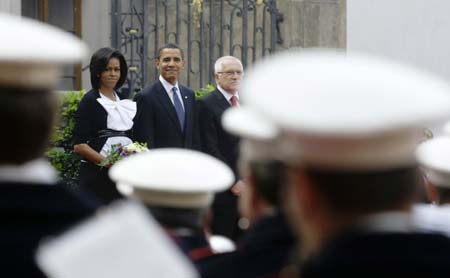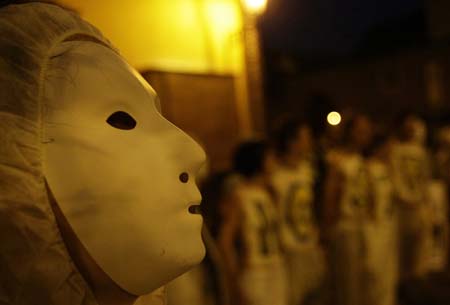By Wu Liming, Ban Wei
When US President Barack Obama enthusiastically called on Sunday for "a world without nuclear weapons" in the picturesque Hradcany Square in central Prague, the 30,000 crowds cheered with thunderous applause.
But for politicians and analysts, questions may rise: Is it realistic? Does he mean business or just play lip service?
 |
|
US President Barack Obama (2nd L), US first lady Michelle Obama (L) and Czech Republic's President Vaclav Klaus attend the official welcoming ceremony at Prague Castle April 5, 2009. US President Barack Obama will call for the elimination of all nuclear weapons across the globe, in remarks on Sunday he hopes will lend credibility to his message in atomic disputes with Iran and North Korea. [Xinhua] |
Everybody, including Obama himself, knows the road to a non-nuclear world could be bumpy.
"I'm not naive, the goal can not be reached quickly, perhaps that's not in my lifetime," Obama told the crowds in Prague.
The United States boasts the biggest nuclear arsenal in the world. The country far outnumbers Russia and other major nuclear states, with some 4,000 atomic warheads in stock.
Washington has long put its nuclear advantage at a key point in its national security strategy, and Obama's predecessor, George W. Bush, had adopted a more aggressive policy in maintaining the country's advantage in this regard.
The Bush administration had striven to develop anti-missile defense program, and the former president declared unilateral withdrawal from the 1972 Anti-Ballistic Missile (ABM) Treaty in December 2001.
Observers believe that Obama's commitment for "a world without nuclear weapons" signals Washington's possible adjustment of nuclear strategy, or at least, a departure from the Bush administration.
In his speech in Prague, Obama not only stated "clearly and with conviction" his country's commitment and leadership in eliminating nuclear arms, but also tabled "concrete steps" in pushing his dream into reality, including hosting a world summit on nuclear security within next year.
The "concrete steps" included efforts to ease the role of nuclear arsenal in US national security strategy, to conclude talks with Russia on a new "legally-binding" strategic arms reduction treaty and to pursue US ratification of the Comprehensive Test Ban Treaty.
Obama's initiative on building "a world without nuclear weapons" was, by no means, a flash of idea.
As early as on his campaign trail, Obama had said his arms-control efforts would follow the parameters laid out by the Nuclear Security Project, whose initiatives, including a plan for sharp reductions in US nuclear stockpiles, were crafted by centrists including former Democratic senator Sam Nunn and former Republican secretaries of state Henry Kissinger and George P. Shultz.
 |
|
Protesters demonstrate against war outside Prague Castle April 5, 2009. Thousands of Czechs are expected to turn up for U.S. President Barack Obama's speech at a square outside the medieval Prague Castle on Sunday, with the panorama of the historic Czech capital in the background. Obama will call for the elimination of all nuclear weapons across the globe, in remarks he hopes will lend credibility to his message in atomic disputes with Iran and North Korea.[Xinhua] |
Shortly after his inauguration, the White House website posted Obama's agenda, including his pledges to "stop the development of new nuclear weapons" and work for a worldwide ban on the production of material for nuclear weapons.
However, such call will arouse opposition from home and abroad, Jan Techau, head of the European studies center of the German Council on Foreign Relations, told Xinhua. Obama is faced with potential opposition even within his own cabinet, Techau said.
US Secretary of Defense Robert M. Gates said last fall that developing new warheads was vital and building the so-called Reliable Replacement Warhead was essential to ensuring that the nation's nuclear defenses remain viable for years to come.
It will also be hard for Obama to persuade other nuclear countries to follow suit.
Nevertheless, Techau said it "is realistic" to expect a cut on nuclear arsenal. For one thing, maintaining an immense nuclear arsenal, capable of destroying the planet for several times, is costly.
A rational cut of nuclear ammunition will also benefit both the United States and Russia, the two biggest nuclear rivals.
Obama's enthusiasm for a non-nuclear world is also attributable to the US strategic consideration concerning Iran and the nuclear issue on the Korean Peninsula.
"In so doing, President Obama intends to increase Washington's credibility in resolving the Iran issue," Techau said.
(Xinhua News Agency April 7, 2009)